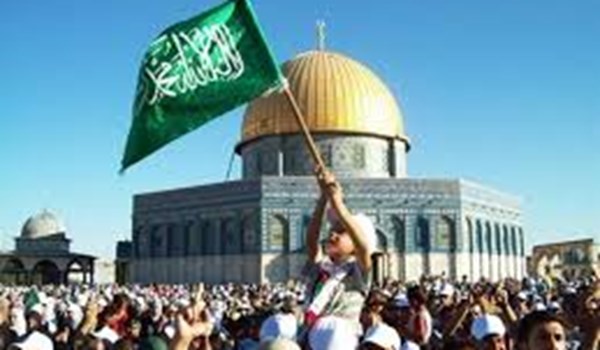
RNA - Trump’s controversial declaration was endorsed by Tel Aviv, and pretty much nobody else. France slammed the unilateral move, while Britain warned the declaration risked doing serious harm to the peace process. Across the Arab world, the complaints understandably centered more heavily on the implications for occupied East Jerusalem, and concerns that Trump had effectively meant recognition of the occupation as permanent.
While Israelis expressed hope that Trump’s statement could lead to a rush of recognition for Jerusalem this broadly appears not to be the case:
- The city is holy to three religions. It is a powder keg, and the wrong move by Trump there could set off a religious war. The Arab-Israeli conflict will never be solved until the Jerusalem Al-Quds question is resolved.
- Over 160 countries that have diplomatic relations with Israel don’t recognize Jerusalem Al-Quds as its capital. The United States has just done that now, nearly seven decades after it created Israel on occupied Palestinian lands. This has become a source of apprehension worldwide.
- The city is important to Christianity and Islam, which between them have more than 3 billion followers worldwide. For Christians, Jesus, their messiah, died in there and came back to life there; they can trace his genealogy back to King David, who established the united monarchy in Jerusalem Al-Quds and whose descendants, according to the Hebrew Bible, will include the Messiah. For Muslims, Jerusalem A-Quds – specifically “the farthest mosque,” identified with Al-Aqsa Mosque – was the destination of Prophet Mohammad (SAWA) on his Night Journey, from where he ascended to heaven to speak with God. The Al-Aqsa Mosque was also the Muslims' first Qiblah until God ordered the Prophet to change the direction towards Mecca when doing prayers.
- For each of these religions, there is a spot in the Old City of Jerusalem that is most sacred, and it is the focus of their strongest, deepest passion and commitment: For Jews, it is the Holy of Holies, whose precise location is no longer known, making the entire Temple Mount holy ground; for Christians, it is Calvary, where Jesus was crucified, which, for a majority of followers, is situated in what is today the Church of the Holy Sepulchre; while for Muslims, Al-Aqsa has come to refer to the entire Haram al-Sharif.
- When the United Nations, on November 29, 1947, gave its imprimatur to a plan to divide the occupied Palestine into two states, one Arab, one Jewish, it famously left Jerusalem Al-Quds out of the equation, intending it and its surroundings to become an internationally administered, separate territory – a corpus separatum. The Jews accepted the plan, and Ben-Gurion noted that the loss of Jerusalem as part of Israel was the “price we have to pay” for a state in the rest of the land.
- When the Palestinians rejected the Partition Plan, and launched a war on Israel, the latter no longer considered itself bound by the boundaries set by the UN plan. During the war, Israel improved its strategic position in most parts of Palestine, and in Jerusalem Al-Quds, when the cease-fire lines were drawn, Israel occupied the western part of the city and the Jordanians the city’s east, including the Old City, where the Western Wall and Temple Mount are situated. Officially, the UN stuck with its internationalization plan after the war.
In recent decades, everyone’s position has hardened too. Clearly, the world community could not give a hand to Israel’s unilateral steps in East Jerusalem Al-Quds, nor its so-called facts on the ground, in the form of tens of thousands of apartments in illegal neighborhoods occupied in the east. And the Palestinians appear not to be ready to compromise on the condition that the capital of any future state be situated in East Jerusalem Al-Quds.
Although Israelis and Palestinians have been negotiating off and on, for more than 25 years, talks on Jerusalem Al-Quds have never gotten very far. So long as the sides cannot decide on a mutually agreeable plan for sharing sovereignty in Al-Quds, or on any other arrangement there, nor has the world community concluded that it must impose a solution on the sides, it would be highly improbable for any individual state or party to unilaterally give official recognition to Jerusalem Al-Quds as its capital. This includes the United States.
After Trump’s declaration on Wednesday, however, the world holds its breath, knowing this may be the closest thing to a new Palestinian uprising and the geopolitical earthquake it would unleash. Trump is weak, falling in the polls, beleaguered by an ever tightening investigation into Russian ties, and in need of a distraction.
Moving the US embassy also means maximum aid and assistance to Israeli extremists and the Netanyahu administration. The move by Washington which put a bullet in the head of the US' so-called mediating role in the Middle East conflict provides a huge boost for their efforts to kill the peace talks and occupy the rest of the city through war and illegal construction. The international community and the United Nations do not want the move because Israel is not recognized by the Muslim world as a state and its final status has not been settled in negotiations with Palestinians.
In addition to a thousand more points and questions that need to be contemplated, the US move has raised a main question for many: Has the Antichrist triggered the Armageddon?
847/940